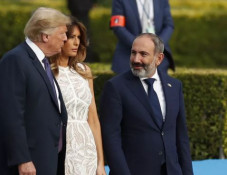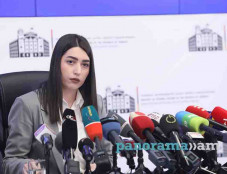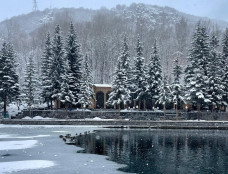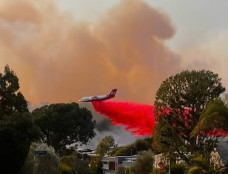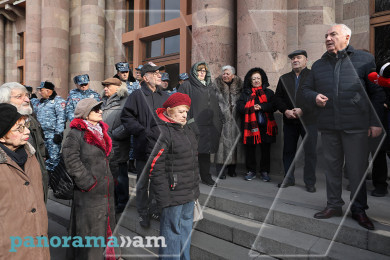General Provotorov about January 1990 in Baku: Women and children were seated in buses on ‘barricades’ and crowd of young drunk men behind them
Major General V. L. Sokolov’s personal meeting with E. Mammadov, the ‘commander,’ exposes the real aims of the Popular Front of Azerbaijan and its ‘military leadership.’ Mammadov gave him an ultimatum to withdraw the Soviet troops highlighting that the army must carry out its external functions rather than the role of a gendarme. “We demand that the army does not shoot at the people,” he said. When asked who said that the army was going to shoot at the people, the ‘commander’ did not give a clear response. Major General of justice V. G. Provotorov writes about the events in an article titled ‘Baku: The Beginning of the Nineties,’ which was published in ‘Military and History Journal’ No 7 in 1990.
See the beginning of the article here.
Major General Sokolov demanded that Mammadov gave an order to unblock the military towns as it disturbed the everyday activities of the units. In particular, it did not allow them to take food, water and hot meals, to organise the garrison service and humiliates the honour and dignity of the Soviet Army. But Mammadov refused to comply with the just and legal requirement.
In addition, he was asked several questions: Why a reconnaissance of military towns is carried out? What was the aim of seizing four tanks at the unloading station, as well as two officers, colonels Tyapkov and Broslavsky? “But I gave an order to return the tanks and release the colonels,” the ‘commander’ answered sneering.
He could not explain the aims of both of those and other not only provocative but also openly hostile actions of the extremist militants. The latter had seized the radio station stealing blocs, documents and arms on January 19. Major Korchagin, the commander of the communications of the tank regiment, was wounded when repulsing the attack. Mammadov said he had no information about that avoiding an answer in the discussion of that case, too.
According to the article, it was practically impossible to get into many military towns since January 19. All the adjacent streets were packed with lorries, buses, cisterns with fuel and liquefied gas.
The city highways were also blocked on the sections taking to the airport and to the entrances to the city. Militants, armed with automatic weapons – including machine guns – openly started to appear on the barricades and roofs of the houses and administrative buildings (of the Ministry of Automobile Transport, of the centre for Automated Control System, of the Central Statistical Administration and others) surrounding the military towns. Searchlights and lanterns were installed on the balconies of those buildings. They were turned on when it was getting dark, and their targeted light illuminated the territory of the towns the whole night as groups of people crowded around them twenty-four hours a day.
Numerous observations of such actions indicate that the extremists implemented cunning tactics, as well as fanatic nature of criminals. For example, on the approaches of the ‘barricade’-blocs, women and children were seated in buses, and a mob of incited young people got behind them often drunk, and assumingly under the influence of drugs. And the armed militants, ‘the commanders’ and ‘the instructors’ hid behind such a ‘human shield.’
This scheme of establishing ‘military order’ could be found practically everywhere. In the same period, the boats of the Caspneftegazprom – whose actions were controlled from motor ship Orujev, where the ruling core, the ‘headquarters,’ of the PFAz was based – completely blocked the sea-lane for the exit of the ships of the Red Banner Caspian Flotilla. The ‘headquarter’ efficiently reacted at all the changes of the circumstances and issued corresponding arrangements using the radio station of the boats. The militants’ concentrated forces blocked the civil airport (its work was completely paralysed). Even the military personnel, who arrived from vacations, were not allowed to enter the city and were forcibly taken out of any type of transport. The vehicles with guards were detained on their way to their duty stations, while on the second half of the day, anyone, even those responsible for the vital functions and hospitalisation of the sick people, were detained. The military personnel started to be beaten in front of their houses and searched at entering the checkpoints of the units.
The author writes that amid the open humiliation of the army, attempts were made to appeal to the people in the ‘barricade’-blocs everywhere with calls to come to reason, and with requests to disperse and restrain from making obstacles for the troops, which would unblock the military towns and the approaches to them. For example, such an appeal was made in Major General N. F. Zubkov’s speech on January 19 at eleven o’clock. He called on the people to go home, not to expose their life to danger, to take away the women and children, not to use arms as a response to the troops’ actions of removing the obstacles on the approaches to the military towns. A group of PFAz leadership appeared at that time and carried out an efficient briefing for the militants’ ‘commanders’ and ‘instructors.’ A real hysteria burst out in the crowd after that. Arms, incendiary bottles and self-made explosives openly showed there. The militants started to augment their power by getting on prominently high places, the positions convenient for firing at the military town, roofs and balconies of adjacent buildings.
“Actions to finally block the checkpoints and approaches were taken up since 15 o’clock. The approaches were literally ‘packed’ with cars loaded with pieces of stone, road metal, reinforced concrete slabs and transport working with oil and gas. The military towns actually appeared in a complete siege along the whole of their perimeter. One could not get to them even alone,” the Major General describes.
After the Defence Ministry of the USSR made a decision to unblock the military towns, as well as the roads and highways taking to military facilities, the troops acted correctly and accurately, demonstrating humanism, courage and self-sacrifice. One of the unit’s armoured groups was not taken out through the checkpoint, where small groups of people stood, but through another place, through a broken part of the fence, which they rammed with tanks. Meanwhile, there was no civilian victim. The soldiers – mainly from the designated personnel – set on distributive works. In response, the militants opened a large-scale fire at the personnel. The gust of fire hit to the military town, where people were lodged in tents. It is not a secret that the locals were aware of the units and subdivisions lodged in the military town. It is of special mention that the medical battalion was under an even more intensive fire.
“How can then one speak about the militants’ mercy? The residential buildings of the officers were also fired at, and the numerous shell-holes in the buildings on the side of the city prove that. The soldiers started a response fire only after some of them were killed, among them Senior Reserve Sergeant V. P. Gamartsev, Senior Sergeant S. N. Pyatakov and others. Already on the first day after the beginning of the removal of the obstacles, or on the first minutes, to be more precise, several soldiers of the storm army and the internal troops of the Internal Ministry, as well as a soldier’s wife, were killed,” Provotorov writes.
The troops did not fire at the civilian crowds, as the PFAz leaders try to introduce, but only as a response to the fire of the militants and snipers on the roofs and balconies of the buildings. Even with this, when the militants pushed a woman with a child onto the balcony, none of the soldiers’ shells flew in that direction, the Major General highlights.
Naturally, the possibility of death of separate unarmed citizens cannot be completely ruled out, as it was a real fighting and it was practically impossible to remain psychologically stable all the time and exclude any random shot.
To be continued.
A mass pogrom of Armenian population was committed in Baku from 13 to 19 January 1990 as a culmination of the genocide of the Armenians in Azerbaijan unfolded between 1988 and 1990. After the Sumgait pogroms (26-29 February 1988), persecutions, beatings, particularly cruel killings, public mockeries, pogroms of separate flats, seizure of property, forcible expulsions and illegal dismissals of Armenians started in Baku. Only some 35 or 40 thousand Armenians of the community of 250 thousand remained in Baku by January 1990; they were mainly disabled people, old and sick people and the relatives looking after them. The pogroms took an organised, targeted and mass nature since 13 January 1990. A large amount of evidence exists about the atrocities and killings committed with exceptional cruelty, including gang rapes, burnings of people alive, throwing people out of balconies of higher floors, dismemberments and beheadings.
The exact number of the victims of the genocide of the Armenians in Baku still remains unknown. According to different sources, between 150 and 400 people were murdered, and hundreds were left disabled. The pogroms went on for a week amid a total inaction of the authorities of Azerbaijan and the USSR, as well as the internal troops and the large Baku garrison of the Soviet Army. Those who managed to avoid death were forced into deportation. The Soviet troops were deployed to set order in Baku only on 20 January 1990.
For more detail, visit KarabakhRecords .
Related news
- 26 years after genocide of Armenians in Azerbaijan: “I remember Baku and again feel smell of burnt human flesh…”
- “This is impossible to forget and to forgive”: A Century-Long Genocide. Black January of Baku film demonstrations in US
- 26 years after genocide in Baku: “They called and threatened to finish off with us as they had done with our niece in Sumgait”
- 26 years after genocide in Baku: “Baku received order from Moscow not to intervene in pogroms and allow them easily slaughter Armenians”
Newsfeed
Videos





